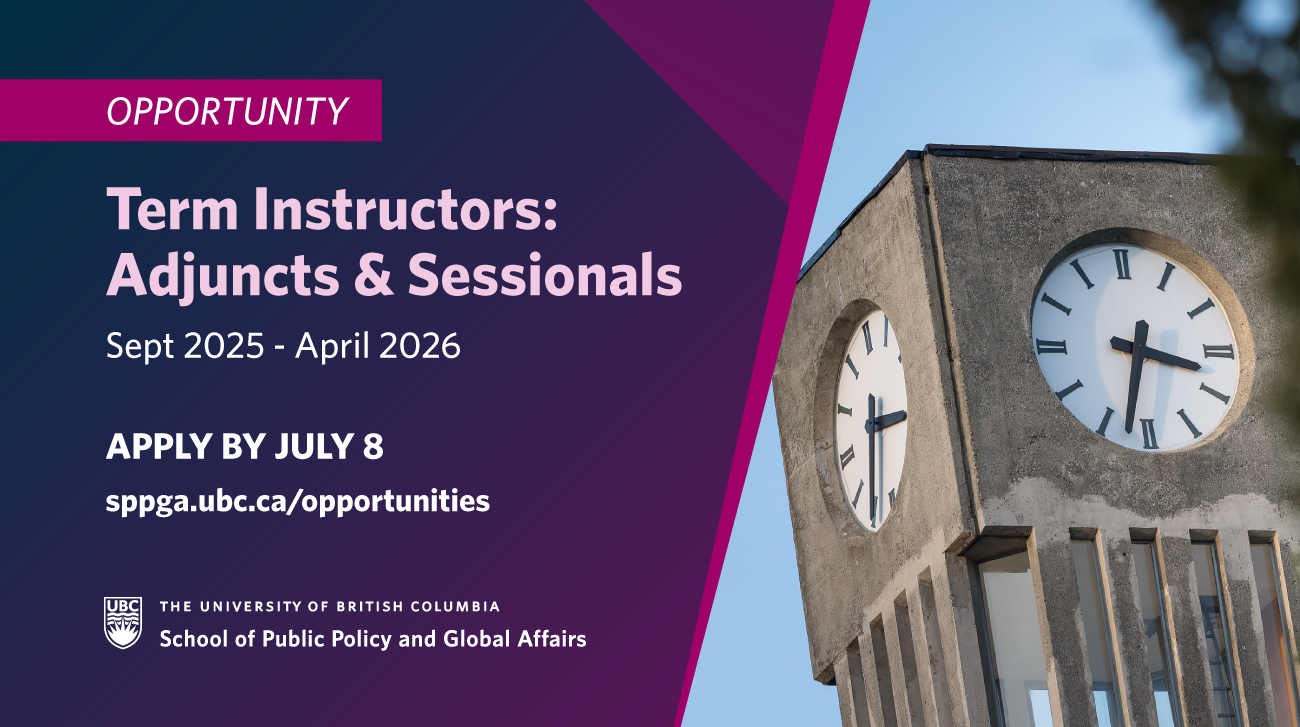

Transformative Memory International Network
UBC’s School of Public Policy and Global Affairs (SPPGA) congratulates Erin Baines (SPPGA), Sheryl Lightfoot (SPPGA; Department of Political Science; First Nations and Indigenous Studies), Heidi Tworek (SPPGA; Department of History), Yves Tiberghien (SPPGA; Department of Political Science; IAR), Chris Tenove (Interim Director CSDI) and M.V. Ramana (SPPGA) who are all working on prominent initiatives that have been awarded funding through the Social Sciences and Humanities Research Council’s (SSHRC) Partnership Grants and Insight Grants.
On August 29, SSHRC announced nearly $150 million in federal research funding awarded to 605 researchers working in social sciences and humanities disciplines at institutions across Canada. Of this, 57 are UBC-led research projects totaling a combined grant funding of $10.3 million. Several of these major research projects involve SPPGA faculty and directors including:
The Transformative Memory International Network (awarded $2,298,680)
Erin Baines and Pilar Riaño-Alcalà, Co-principal Investigators; Sheryl Lightfoot, Collaborator
Details: As a global collective of artists, academics and community leaders, the Transformative Memory International Network opens intellectual, affective and creative spaces to interrogate the ways memories of political violence activates alternative ways of seeing, listening and being in the world; serves to persevere, regather and refashion ways of being together in the precariousness of ongoing violence; emerges in sentient beings, landscapes, bodies, and objects; and, anticipates a different kind of future, and so exceeds the political, social and legal institutions that maintain relations of power, dispossession and oppression.
Drawing on Indigenous, Black, and Global South knowledges, the TMIN situates the work of memory as a generative, living force located in the everyday worlds of survivors. TMIN aims to change the way policy, scholars and artists think about memory as a practice of social and political transformation, and as such works toward inclusive communities and justice in the aftermaths of mass violence. The project brings together 14 university and community-based partners with 40 collaborators and co-applicants from Canada, Colombia, Indonesia, Peru, Northern Ireland and Uganda. The Grant Award is for 2.3 million, plus 3 million in matching cash and in-kind funds for 5 years.
Alongside SPPGA and the Social Justice Institute, TMIN partners with and is supported by UBC’s History Department, Museum of Anthropology, The Belkin Art Gallery, Collaborative Digital Heritage Studio (CoDHerS), and the Indian Residential School History and Dialogue Centre. Read more about the Transformative Memory International Network here.
A Global Comparative Study of Policies to Protect Democratic Participation on Social Media Platforms (awarded $282,525)
Heidi Tworek, Applicant; Yves Tiberghien, Collaborator; Chris Tenove, co-lead
Details: The project is about social media platform regulation and election integrity. The four-year project will investigate the policies that governments and platforms have adopted around the world to regulate communication during elections. The project builds on Tworek and Tenove’s research on platform governance, disinformation and hate speech, and online abuse of political candidates and officials.
To advance their research, Tworek and Tenove will collaborate with an interdisciplinary team of researchers in Canada and internationally. They will conduct in-depth case studies and comparative policy analysis across regions and social media platforms to extend current research that tends to focus on single countries, regions, or platforms. This research will then be shared via academic publications, policy reports, and engagements with policymakers, civil society groups, and citizens. Read more on the CSDI website here.
Contesting Energy Discourses through Action Research (CEDAR) (awarded $376,562)
Susan O’Donnell (St. Thomas University), Applicant; M.V. Ramana, Co-applicant
Details: Most people agree we need to transition how we use energy if we are to mitigate climate change. There is, however, a big debate over what to transition to. The media in Canada often promotes voices and institutions aiming to maintain the current infrastructure or expand it, resulting in continued use of fossil fuels, perhaps with carbon capture and storage, and building speculative small modular nuclear reactors in the somewhat distant future.
There is little attention paid to alternative scenarios that focus on energy conservation, consider ways in which energy and material use can be reduced, promote decentralized renewable energy generation, and end social and environmental injustices related to energy production and consumption. The five-year project is studying the organizations promoting the dominant discourses and the alternative pathways, and how action research can contribute to a more democratic media environment. Read more on the CEDAR website here.
Maximizing Indigenous self-determination: Theory and practice of Indigenous sovereignties in settler states and the international system (awarded $397,520)
David B. MacDonald (University of Guelph), Applicant; Sheryl Lightfoot, Co-applicant
Details: This project expands on the ongoing 2017 IG “Complex Sovereignties” (complete in March, 2024). It seeks to document, measure, and compare how Indigenous political actors in Canada and other countries are advancing self-determination in assertive, maximal, innovative, and peaceful ways. Indigenous practices of self-determination bring new conceptions of territory, citizenship and international legal personality to the fore, and rely on a foundation of Indigenous identity, philosophies, legal and political orders.
This research program will explore distinct, but overlapping and complementary, forms of self-determining practice, including passports, independent trade or diplomatic missions, involvement in elements of state external sovereignty, treaty relations, territorial and economic self-determination, pooled sovereignty, global organizing beyond the state, and the rebuilding and assertion of nationhood. It will closely involve Indigenous and other collaborators in Canada, Aotearoa New Zealand, Australia, Nordic countries, helping policy makers to better conceptualize how to support self-determination efforts as a means of affirming mutually respectful, nation-to-nation relationships, as articulated in UNDRIP.


